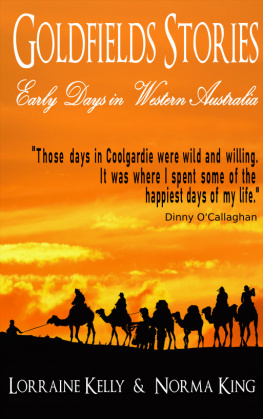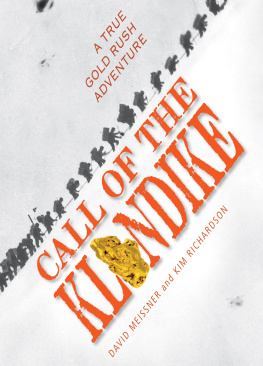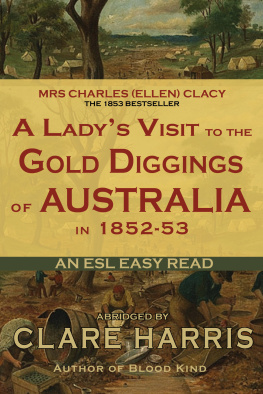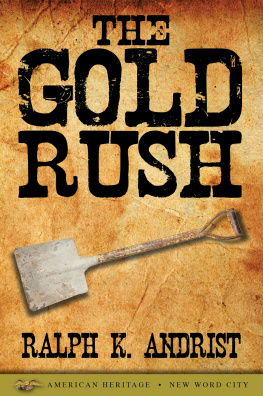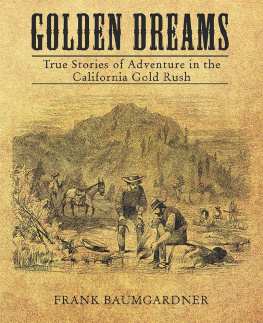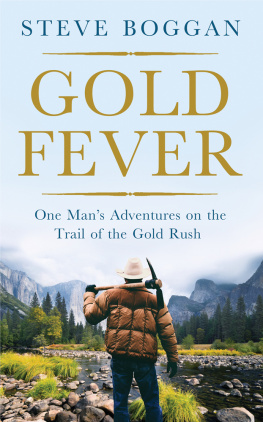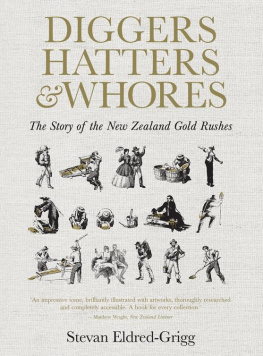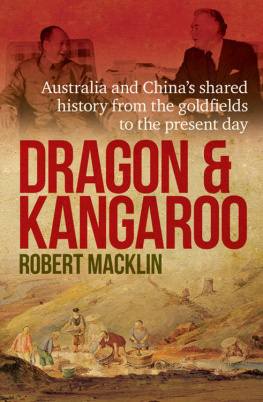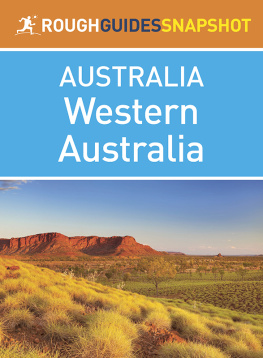Goldfields Stories:Early Days in Western Australia
Copyright 2018 by Lorraine Kelly.
All rightsreserved.
No part of thisbook may be used or reproduced in any manner whatsoever withoutwritten permission except in the case of brief quotations embodiedin critical articles or reviews.
For informationcontact:
Lorraine Kelly
27 Valentine Way,Australind WA 6233
goldfieldstories.com
@goldfieldstories
Book and Coverdesign by Lorraine Kelly - LozsArt
ISBN:978-0-9876322-0-3
First Edition:December 2018
Acknowledgments
I would like tothank my family for allowing me to archive and use Norma Kingsresearch. It is an honour to have at my disposal her life timeswork. I would also like to thank everyone who has encouraged me towrite and self-publish this book.
My Nanna'sbook, Colourful Tales of the Western Australian Goldfields wasthe inspiration for this book. I have revised, researched, andillustrated some of the stories it contained. As such, even thoughNorma is no longer with us, it is a book co-authored betweenus.
In theacknowledgments to her book, she thanked:
Hocking andCo. and West Australian Newspapers Ltd for allowing her toreproduce articles she wrote for their publications;
the EasternGoldfields branch of the Western Australian Historical Society forproviding material for use in the book;
herbrother-in-law Bernie Rutland for the idea of the book;
Baron Hillfor permission to include his poem End of the Rainbow;
her daughterZena and husband Howard for their advice and criticism; and
the manypeople who told their stories and provided photos.
I trust youwill enjoy these stories as much as I did in researching them.
Contents
Financial conversion
To helptranslate the value of the pound in todays term, the 1890saverage wage was 150 per annum. They needed to produce thirtyounces of gold a year to make an average salary (Compton).
Authors Note
This bookcontains many quotes that are now culturally unacceptable. They areincluded as it represents the use of the language used in earlyAustralia. This language does not express the authorsopinions.
Although thisbook is based on Colourful Tales of the Western AustralianGoldfields, it is somewhat different. This is particularly so forthe account of Merton and his find. A thesis by Chappell examinedthe myths surrounding him and the operation of the mine in detail.It would have been remiss of me to continue the myths which are nolonger supported by facts she uncovered. I found her thesis veryinteresting and am indebted for her insight and vigorous study.
The Tom Dimerstory was not in the original book. This story has come from herresearch and interviews she taped with him in the 1970s and1980s. I have restored and published these interviews. You canfind them at Goldfieldstories.com.
The poem Deathis Nothing at All was written by Henry Scott-Holland (1847-1918).He was a priest at St. Paul's Cathedral of London. It was part of asermon he gave while the body of King Edward VII was lying in stateat Westminster. It was also read at my Nannas funeral, and I feelas though she is in the next room now
Death Is Nothing atAll
By Henry Scott-Holland
Death is nothing atall.
It does not count.
I have only slippedaway into the next room.
Nothing hashappened.
Everything remainsexactly as it was.
I am I, and you areyou,
and the old life thatwe lived so fondly together is untouched, unchanged.
Whatever we were toeach other, that we are still.
Call me by the oldfamiliar name.
Speak of me in theeasy way which you always used.
Put no difference intoyour tone.
Wear no forced air ofsolemnity or sorrow.
Laugh as we alwayslaughed at the little jokes that we enjoyed together.
Play, smile, think ofme, pray for me.
Let my name be everthe household word that it always was.
Let it be spokenwithout an effort, without the ghost of a shadow upon it.
Life means all that itever meant.
It is the same as itever was.
There is absolute andunbroken continuity.
What is this death buta negligible accident?
Why should I be out ofmind because I am out of sight?
I am but waiting foryou, for an interval,
somewhere verynear,
just around thecorner.
All is well.
Nothing is hurt;nothing is lost.
One brief moment andall will be as it was before.
How we shall laugh atthe trouble of parting when we meet again!
Norma King
1922-2014
Norma was bornin Kalgoorlie in 1922. A life member of the Eastern GoldfieldsHistorical Society, she spent her life living and recording historyin the region. Her work on social history was particularlyimportant, documenting where people in the Goldfields came from,where they stayed and what they achieved.
In 1972 shepublished her first book, Nickel Country, Gold Country. Sevenmore books followed, being: Colourful Tales of the WesternAustralian Goldfields (1980), The Waldeck Story (1980), Daughtersof Midas (1988), Wings Over the Goldfields (1992), The Voice of theGoldfields (1995), The Hannans Club The first 100 Years (1996),and her autobiography, Then They Called me Norma (2003). She alsowrote numerous historical pamphlets and articles for the KalgoorlieMiner.
She was also alife member of the WA section of the Fellowship of AustralianWriters and The Golden Mile Art Group. In 2013, she received theOAM (Order of Australia) for her service to the Community as aHistorian. In 2014 she was included in Kalgoorlies walk of fame inHannan Street.
Lorraine Kelly
Lorraine isNormas Grand-daughter. Born in Kalgoorlie, Lorraine moved to Perthwith her family at ten years of age. After completing a Bachelor ofArts Degree in English and History at UWA, she worked in theFinance Industry in Perth. In 1997 she moved to Australind to raiseher family.
From 2017-2018she created and self-published several adult colouring books. In2018 she also began archiving Norma Kings research material. Thisresulted in the publication of this book. The cover design,interior, illustrations were done by Lorraine, under the name ofLozsArt.
For moreinformation regarding this book, go to goldfieldstories.com
Chapter One:
Pocket Hercules -Dinny OCallaghan
WHEN COOLGARDIEWAS NEW and luring men from all parts of the country, many interesting characters rode ortrudged into town. Among them was pint-sized, bantam-weight Dennis(Dinny) OCallaghan, who was also known as Pocket Hercules.
Dinny arrivedfrom Broken Hill on 4 February 1893, eleven days before hiseighteenth birthday. With just over three pounds in his pocket hewas 1,500 miles from his parents' home; "too far away to go homefor a good dinner or a good bed at night." He left behind hisfamily that had immigrated from Ireland, and he did not know a soulin his new town.
He was alreadyan experienced digger as he had been working in the goldfields inSouth Australia from age ten. When the government officials madetheir periodic raids on miners to check mining rights, they allowedhim to continue mining even though he was too young to hold alicence.
Upon arrival atCoolgardie, he immediately set up his 6x8 foot tent. Within hourshe was fossicking for gold. He got a few shillings worth on hisfirst day.
It was a dustytown due to the dryblowing activities of the prospectors, and thebuildings were mostly canvas. There were three-hundred men on thefield, and as he expected, it looked a poor place to live. The population of Coolgardie in theearly days was made up of men from all parts of the globe. Quite alot had previous mining or business experience from Ballarat,Bendigo in Victoria, New South Wales, New Zealand, America, Mt.Brown, Tetulpa, and Broken Hill.

